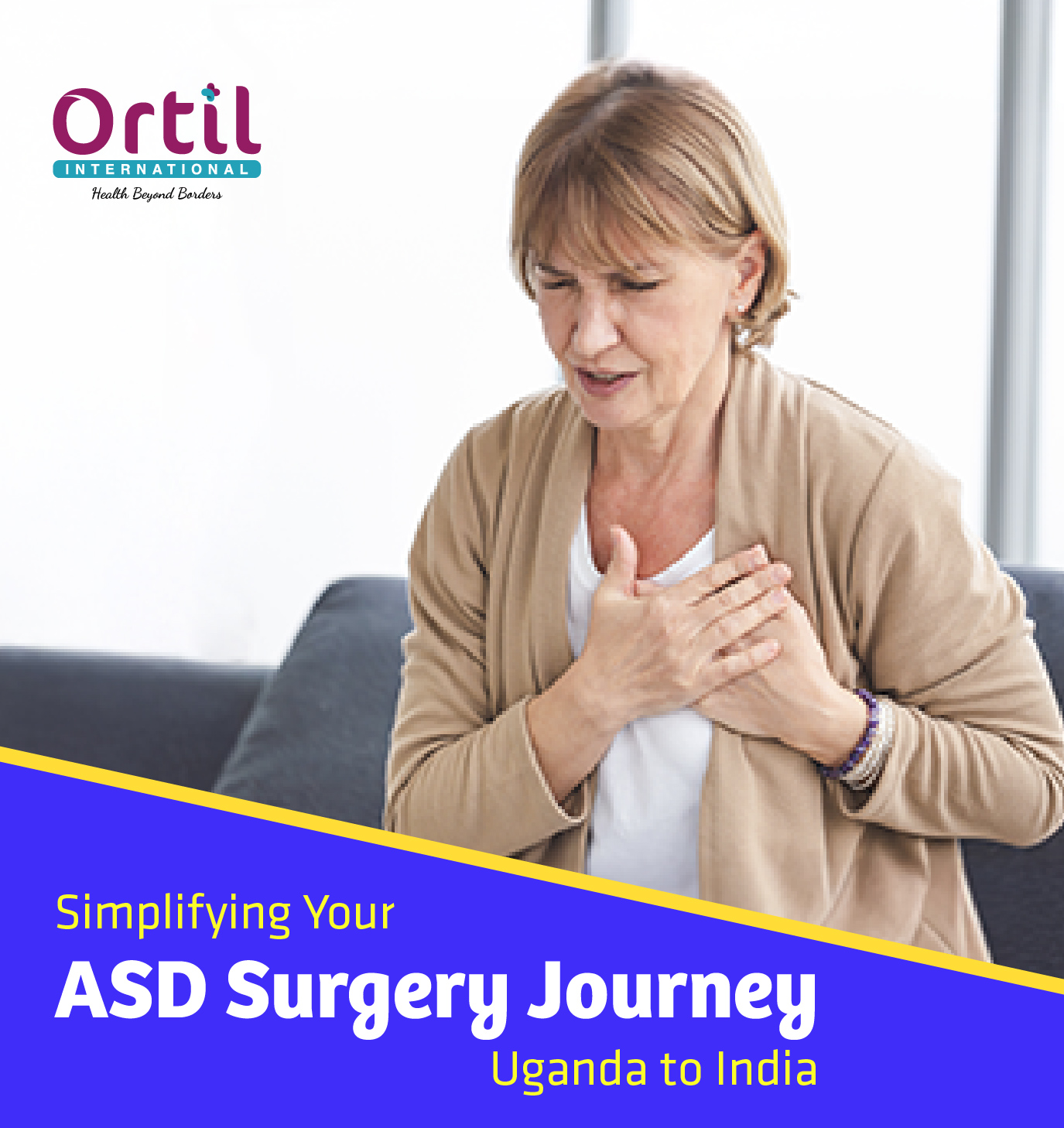From Uganda to India: Your Journey for ASD Surgery Simplified
Summary
This comprehensive guide is designed for Ugandan patients seeking atrial septal defect surgery (ASD) in India. It explains the condition, the types of procedures available, the cost breach, the treatment options, and how Uganda patients can access world -class heart care in India at affordable rates.
Introduction
The defect of the atrial septum is a common congenital cardiac condition that affects many individuals in Uganda, especially children. Due to limited access to Ugandan Specialized Heart Surgery, more patients are turning to India for advanced treatment and specialized care options.
Understanding of Atrial Septal Defect and Surgery
A atrial septal defect is a hole in the wall (septum) between the two upper chambers of the heart. For many patients in Uganda, this can lead to complications if not treated, including heart failure, stroke or pulmonary damage. Fortunately, ASD surgery in India offers effective and permanent treatment for Uganda citizens.
What is Atrial Septal Defect and Surgery
In Uganda, atrial septal defect is typically diagnosed in infancy or early childhood, though some cases may be found later in life. The surgical treatment, widely available in India for Uganda patients, involves closing the hole either through open-heart surgery or minimally invasive catheter-based procedures.
Types of Atrial Septal Defect and Surgery
Uganda patients can be diagnosed with different types of ASD, including:
-
Ostium secundum - most common and often closed with a catheter procedure.
-
Osmium primum-can require open heart surgery, common among Uganda babies.
-
Sinus venosus - rare and surgically treated in India for patients with Uganda.
-
Unroofed coronary Sinus - a complex form managed in Indian centres specialized for Uganda children and adults.
Who Needs Atrial Septal Defect Surgery
Surgery is recommended for patients with Uganda with:
-
Moderate to large asds
-
Symptoms like shortness of breath, tiredness and poor growth
-
History of stroke problems or heart rhythm
Pre-Procedure (Preparation Phase)
Before traveling from Uganda to India, patients must undergo tests such as echocardiograph/ ECG. Indian hospitals assist Uganda patients by offering online consultations, preparing medical visa letters, and booking initial appointments.
Post-Procedure (Recovery and Follow-Up Phase)
Ugandan patients remain in the hospital for 4–7 days post-ASD surgery. Recovery involves a follow-up echo and medication for several months. India-based doctors also offer telemedicine support to continue monitoring patients after they return to Uganda.
Why Choose India
-
Advanced paediatric and adult cardiac centres
-
Skilled cardiac surgeons with global experience
-
Minimally invasive options with fast recovery
-
Affordable costs for Uganda families
-
English-speaking medical teams familiar with treating Uganda nationals
Top Hospitals in India
Cost of Atrial Septal Defect and Surgery in India
The price for ASD surgery in India is comparatively low compared to other nations, making it very affordable. For Ugandan patients, the average price ranges between INR 2,50,000 and 4,50,000 (roughly USD 3,000 – 5,500), depending on the procedure.
Cost Components
-
Pre-transplant Evaluation and Tests (for Uganda patients): INR 20,000 – 30,000
-
Surgery and Hospital Stay: INR 2,00,000 – 3,50,000
-
Post-Surgery Medications and Follow-Up: INR 15,000 – 40,000
Total Estimated Cost
The total package for Uganda patients seeking ASD surgery in India ranges from USD 3,000 to USD 5,500, depending on medical complexity and hospital selection.
Cost Comparison in Countries
|
Country
|
Average Cost (USD)
|
|
India
|
$3,000 – $5,500
|
|
Kenya
|
$8,000 – $10,000
|
|
South Africa
|
$10,000 – $15,000
|
|
USA
|
$40,000 – $60,000
|
Treatment Journey for Uganda Patients
-
Online consultation and report sharing from Uganda
-
Medical visa assistance
-
Airport pickup and hospital admission in India
-
ASD surgery and recovery
-
Discharge and follow-up before returning to Uganda
-
Online consultations post-return
Survival Rates
The success rate for ASD surgery in India is over 98%, offering Uganda families peace of mind and high-quality outcomes.
Factors Influencing Success
Success depends on:
Challenges and Solutions
Uganda patients may face:
Solutions:
-
Swahili-speaking coordinators
-
Hospital-provided lodging options
-
Complete travel support for Uganda citizens
Tips for Uganda Planning Treatments in India
-
Get a referral letter from a Uganda cardiologist
-
Ensure passports and medical documents are up to date
-
Carry recent echocardiogram and test results
-
Book accommodation in advance near hospitals
-
Plan for a 2–3 week stay in India
How We Help
Our dedicated team supports Uganda patients by:
-
Coordinating with top hospitals in India
-
Scheduling consultations and getting treatment plans
-
Providing visa help and accommodation options
-
Offering on-going support during and after your return to Uganda
Legal and Ethical Considerations
All Indian hospitals ensure:
-
Ethical treatment for Uganda patients
-
Informed consent processes
-
Transparent billing and fair practices
-
No hidden costs for Uganda families
Recovery and Life after Treatment
Most Ugandan patients recover quickly and return to normal life within a few weeks. Children experience improved growth, better energy levels, and a healthier future after ASD surgery in India.
Conclusion
For Ugandan patients with atrial septal defects, India provides the ideal combination of affordability, expert cardiac care, and compassionate services. With timely treatment, most Uganda patients can live full and healthy lives.
FAQs
Q1: How long should Uganda patients stay in India for ASD surgery?
A: Around 2–3 weeks, including surgery and recovery time.
Q2: Can Uganda patients get ASD surgery without open-heart surgery?
A: Yes, in many cases catheter-based closure is possible, especially for ostium secundum ASD.
Q3: Are follow-ups available after Uganda patients return home?
A: Yes, hospitals offer video consultations and digital reports.
Q4: Do Indian hospitals help Uganda patients with travel and stay?
A: Yes, most provide complete travel assistance, including visa support and hotel arrangements.











